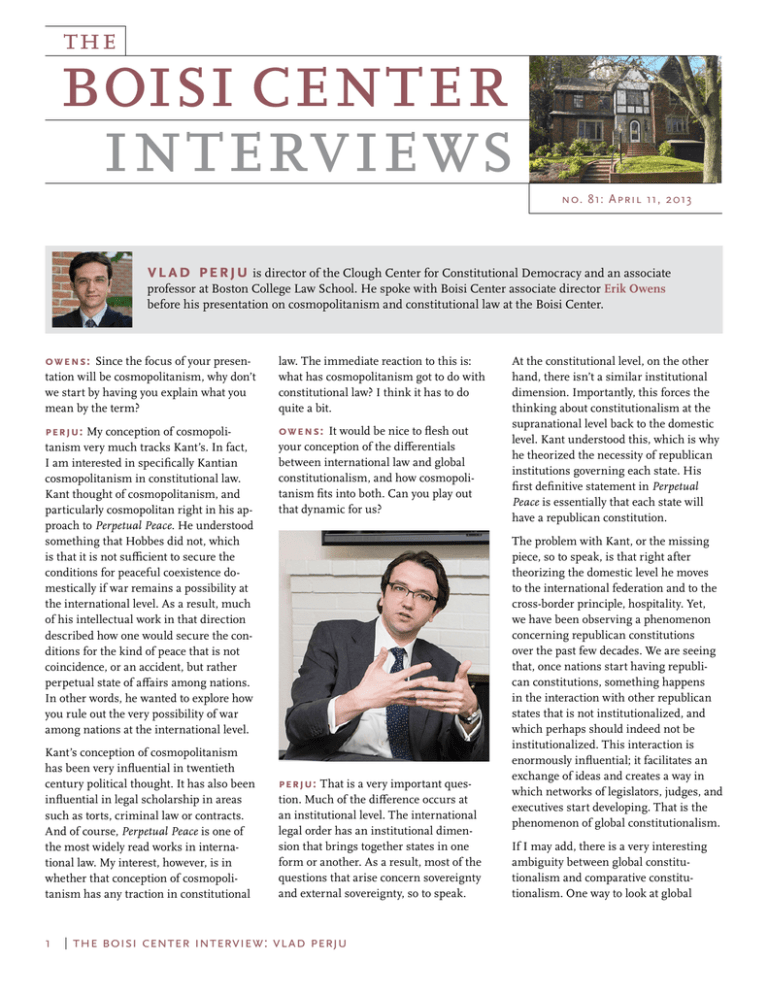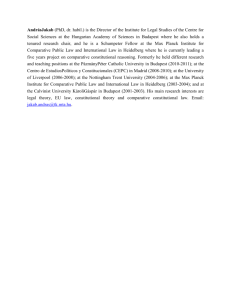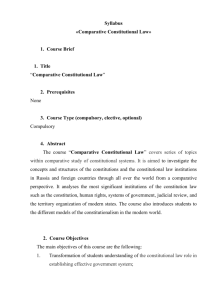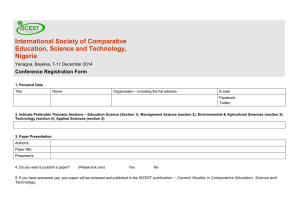Document 11102864
advertisement

the boisi center interviews no. 81: April 11, 2013 vlad perju is director of the Clough Center for Constitutional Democracy and an associate professor at Boston College Law School. He spoke with Boisi Center associate director Erik Owens before his presentation on cosmopolitanism and constitutional law at the Boisi Center. owens: Since the focus of your presentation will be cosmopolitanism, why don’t we start by having you explain what you mean by the term? law. The immediate reaction to this is: what has cosmopolitanism got to do with constitutional law? I think it has to do quite a bit. perju: My conception of cosmopolitanism very much tracks Kant’s. In fact, I am interested in specifically Kantian cosmopolitanism in constitutional law. Kant thought of cosmopolitanism, and particularly cosmopolitan right in his approach to Perpetual Peace. He understood something that Hobbes did not, which is that it is not sufficient to secure the conditions for peaceful coexistence domestically if war remains a possibility at the international level. As a result, much of his intellectual work in that direction described how one would secure the conditions for the kind of peace that is not coincidence, or an accident, but rather perpetual state of affairs among nations. In other words, he wanted to explore how you rule out the very possibility of war among nations at the international level. owens: It would be nice to flesh out your conception of the differentials between international law and global constitutionalism, and how cosmopolitanism fits into both. Can you play out that dynamic for us? Kant’s conception of cosmopolitanism has been very influential in twentieth century political thought. It has also been influential in legal scholarship in areas such as torts, criminal law or contracts. And of course, Perpetual Peace is one of the most widely read works in international law. My interest, however, is in whether that conception of cosmopolitanism has any traction in constitutional 1 perju: That is a very important question. Much of the difference occurs at an institutional level. The international legal order has an institutional dimension that brings together states in one form or another. As a result, most of the questions that arise concern sovereignty and external sovereignty, so to speak. the boisi center interview: vlad perju At the constitutional level, on the other hand, there isn’t a similar institutional dimension. Importantly, this forces the thinking about constitutionalism at the supranational level back to the domestic level. Kant understood this, which is why he theorized the necessity of republican institutions governing each state. His first definitive statement in Perpetual Peace is essentially that each state will have a republican constitution. The problem with Kant, or the missing piece, so to speak, is that right after theorizing the domestic level he moves to the international federation and to the cross-border principle, hospitality. Yet, we have been observing a phenomenon concerning republican constitutions over the past few decades. We are seeing that, once nations start having republican constitutions, something happens in the interaction with other republican states that is not institutionalized, and which perhaps should indeed not be institutionalized. This interaction is enormously influential; it facilitates an exchange of ideas and creates a way in which networks of legislators, judges, and executives start developing. That is the phenomenon of global constitutionalism. If I may add, there is a very interesting ambiguity between global constitutionalism and comparative constitutionalism. One way to look at global constitutionalism is as having its origins in comparative constitutional law. The problem, however, is that, as it stands, the comparative dimension is strikingly under-theorized. If one is interested in global constitutionalism, what use should one have for comparative law? We don’t yet have a good answer to that question. That question really has not been answered thus far. That is partly because scholars of comparative constitutional law, especially in this country, tend to be American constitutionalists who have become so disenchanted with American constitutionalism that they seek an escape by studying the constitution of somewhere else—such as that of Europe, South Africa, India or Israel. Since such scholars come to the subject matter from the standpoint of constitutionalism, they approach the topic without much interest or expertise in comparative law. This is especially the case because the field of comparative law has been dominated by comparative private law rather than comparative public law. Most of the focus of traditional comparative law has been in the areas of how ideas about contract or property or tort law become transplanted or travel. As a result, it is not always easy to translate between the study of comparative private law and the study of comparative public law. But the difficulty of the tasks only makes it more appealing and worthy. owens: You spoke about network effects and Anne-Marie Slaughter, of course, has written nicely about the sort of sub-state networks that take place. How do you see the relationship between the legal networks and other informal networks that she talks about, for example, those among legislators, business folks, regulators, other NGOs, or other groups that operate globally? Is public law—that is sovereign, domestic public law—somehow different in terms of the potential for facilitating supernational networks from other networks of, say, multinational corporations and the regulations that go with them? 2 perju: I think that is a very important question. It definitely has been at the forefront in how people tend to think about globalization and supernational networks. The idea is that there is something special about law that might make it incompatible with these networks. And multinational corporations are driven by economic efficiency and by profit while law is connected to something not entirely similar. It is connected, at least in part, to ideas of self-government and by “If one is interested in global constitutionalism, what use should one have for comparative law? We don’t yet have a good answer.” ideas of legitimacy. With that framework in mind, to explain the question of how I see the matter, I would divide it into two. One is the script of what is happening, and the other one is what should be happening. Let me give you an example. One of the central legal disputes over the past several years, around the world but most prominently in Europe, has revolved around implementing post–9/11 UN Security Council resolutions. Right after 9/11, the United Nations acted with astonishing speed to pass a number of norms for fighting terrorism. These included norms for freezing the financial assets of suspected terrorists, for example. But these Security Council resolutions were adopted under Chapter 7 of the UN Charter, meaning that they were mandatory. Therefore, the moment they were enacted, it was incumbent upon the boisi center interview: vlad perju all the signatories to the UN Charter to secure their implementation. To use the lens of your question, the UN Security Council acted here as a network of executives. The national governments represented in the UN acted very quickly, and outside of legislative oversight, and presumably outside of judicial oversight as well because of standing and other jurisdictional issues. Yet, as you can imagine, subjects impacted by these measures, for instance whose financial assets had been rendered unavailable, sought to challenge the reasons why their names had appeared on those lists. They argued a lack of basic due process to how their names were added to the black list. So it was a very difficult process for them to seek redress in courts. Eventually they did, but, more broadly, what resulted is a network of executives—sort of the unitary-executive feared in the United States, on global steroids. These issues eventually came under the oversight of courts. Specifically, the European Court of Justice asserted the authority to exercise a kind of oversight. It was a remarkable moment where this network of executives, which had been operating autonomously, came under judicial scrutiny. I think that is a great example of what the rule of law can do and I hope to see more of that. It insufficient to describe the interaction of judges, legislators, or agencies without also talking about oversight. There is both potential and danger in the kind of phenomena that Anne-Marie Slaughter describes. We need thick normative accounts of how to preserve the rule of law in this networked world order. owens: And those thick accounts will be culturally bound, not necessarily cosmopolitan, correct? For example, the senses of justice and notions of accountability may differ between the United Kingdom and the mainland Europe, or between Malaysia and Russia. perju: That is true, but I want to leave that answer open. I think that they might remain contextualized in a particular culture, but the one thing that we know about cultures is that they change all the time. We know that ideas travel, they move, they migrate. We know that as they travel, they change the contexts to which they become acculturated. The precise shape that these forces of change will take remains an open question. owens: So when one reads, say, Antonin Scalia’s tirades about international law or comparative law, it begs the question, why would American judges or American lawmakers embrace a model of global constitutionalism of the sort that you are describing? perju: I tried in one of my papers to make the argument as to why they should do it. It is not for prudential reasons, and not primarily because they would learn from what other cultures do. I think judges have to do it as part of their duty to adjudicate the claims before them. Succinctly put, they run the risk of improperly understanding the many dimensions of these claims without looking at the dimensions of freedom or equality that those claims have embedded in them. Any constitutional system is a combination of ideal and of circumstance. Any constitutional claim is basically rooted in the shape of that constitutional system. And I think that to do justice to the claimant, the full dimensions of the claim must be understood. To achieve that, I believe foreign law can be not just useful, but necessary. However, in Scalia’s defense, I would say that the kind of horror story I described with the United Nations is his nightmare of what the international legal system can do. You must have checks, balances, and independent judges, all of which help ensure that the force of law is given only to those regulations that comply with a set of standards. owens: So, I have one last question linked to current affairs. It seems that prime ministers, Viktor Orban in Hungary and Recep Erdogan in Turkey, are 3 pushing for constitutional reforms that enhance their own powers in their own ways. What’s the role of other nations, whether it is collections of nations like the European Union, or the global community, when these situations arise? Is it oversight, is it correction, is it punitive, or is it guidance? Or, is it kind of an old model of negative sovereignty that allows whatever is internally compatible? ies. For this reason, scholars in Europe and the United States have spoken up. Kim Sheppele at Princeton, who has been keeping track of what has been happening in Hungary and has been exemplary for a global legal intellectual, perfectly demonstrates this phenomenon. So, I think that the public sphere is enormously important. However, this is soft power, the power of ideas. perju: I think it is all of the above, and going as far as one can. The examples are somewhat different, of course. Perhaps these situations would be more analogous had Turkey been allowed to join the European Union, when it was pursuing that goal, or if Turkey were still interested in joining the European Union, which it is not anymore. But with respect to Orban and his chilling plan to erode Hungary’s democratic future, I think the global community has an enormous role to play. First, there is global discourse. The kind of laws that Orban has passed in Hungary and, most recently, the fourth amendment to the Hungarian constitution that came into effect just days ago essentially criminalizing criticism of government, must be criticized for what it is: an abject violation of the fundamental values of free societ- I think old-fashioned power is also enormously important. For the first time now, the Treaty of Lisbon includes a special provision, Article 7, enabling the European Union to impose significant sanctions on a state that violates fundamental values of the European Union. These sanctions are not the type of economic sanctions that you see at the UN level, they are political and involve, for instance, suspending the state’s voting privileges. Of course, one must be careful, because things can get very tricky, very fast. Hungary should remain in the European Union, rather than give in to nationalistic centrifugal tendencies. The EU should act with infinitely more political acumen and discipline than it has shown in this matter over the past few years. [end] The Boisi Center for Religion and American Public Life Boston College 2 4 Quinc y Road Chestnut Hill, MA 02 467 tel 617 - 55 2-1860 f a x 617 - 55 2-1863 publife@b c .e du Visit bc .e du/boisi-resources for a complete set of the Boisi Center Inter views and audio, video, photographs, and transcripts from our events. the boisi center interview: vlad perju b oisicenter @b oisi _ center





